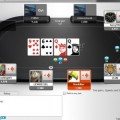
MGA Tax Report Shows Poker’s Insignificance in iGaming Industry

Poker losing significance in the online gaming world according to recent MGA tax report. (Image: cafrino.com)
Poker’s financial strength in the iGaming world appears to be on the decline following the Malta Gaming Authority’s (MGA) interim tax report.
Providing a six-month review of 2015 before a full report is published in May, the MGA’s tax report showed that online poker revenue accounted for around 1 percent of the total tax contributions between January and June 2015.
Casino Games are Top Draw
Although the current figures only represent a six-month period in 2015, the gaming authority has suggested that, of the €14,068,462 in tax paid during that period, poker was the lowest contributor.
“58% of the gross gaming revenue was generated by casino games, followed by sports betting at 34%. Pool betting / betting exchange generated almost 4% of the total GGR for the remote gaming whilst poker accounted for 1%,” read the report.
Despite the relatively meager contributions from the online poker industry, Malta has become a more attractive iGaming destination for a number of companies in 2015.
Following previous issues over player deposits as Everleaf, Joseph Cuschieri was brought in to assume the role of MGA Executive Chairman.
Since taking over, Cuschieri has made the segregation and protection of player funds and priority and that fact has helped the MGA increase the number of remote gaming companies on its books by 14.5 percent in the last 12 months.
The increase in licensees is certainly a sign that the iGaming industry is expanding, but the figures suggest that poker is a much smaller part of the industry than it once was.
Practical Changes Reflect the Stats
From a practical perspective this change in influence has been seen at a number of high profile platforms in the last 12 months.
Since becoming an Amaya subsidiary, PokerStars has added more non-poker provisions to its platform. Moreover, the latest innovations on the poker side of the company, such as Spin & Go tournaments, have been tailored towards casual poker players and casino converts.
Although these changes have angered some poker players, the latest report by the MGA seems to confirm the need for poker companies to diversify their portfolios.
While this news may not be music to the ears of seasoned grinders who want to keep the online poker world as pure as possible, the numbers don’t lie and, if the MGA’s trends are echoed among other iGaming regulators, then 2016 could see more non-poker options finding their way into the top poker sites as the year plays out.















0 Comments